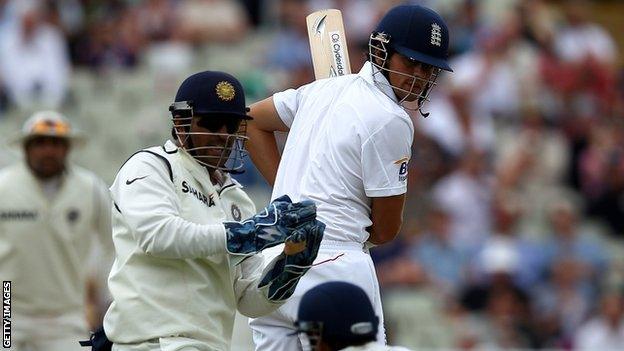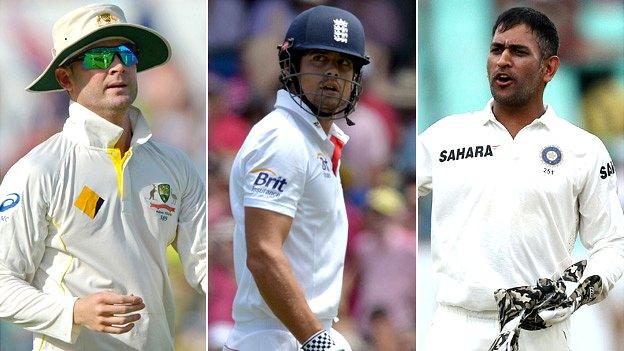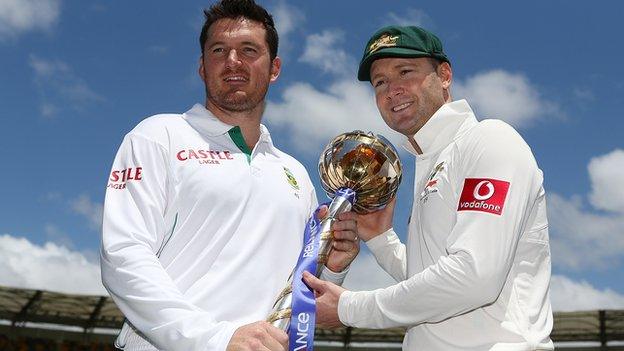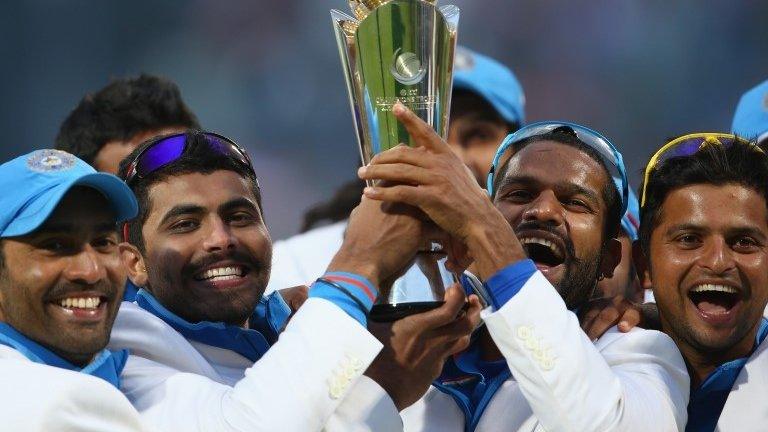England, India & Australia: ICC backs more power for 'Big Three'
- Published

India captain MS Dhoni and England captain Alastair Cook
England, India and Australia are set to gain more control of cricket under controversial new plans agreed by the sport's governing body.
The International Cricket Council (ICC) says proposals for a structural overhaul that would benefit the 'Big Three' received unanimous backing.
However, representatives of Pakistan and South Africa reject that claim.
They insist nothing has yet been approved and say a final decision will be made on 8 February.
Plans to give more power to England, India and Australia were leaked last week and strongly opposed by the boards of South Africa and Pakistan, as well as the international players' union (Fica).
But following a heated six-hour meeting in Dubai, the ICC released a statement announcing the unanimous support for a set of principles relating to its "future structure, governance and financial models".
They included the formation of a new executive committee of five members, with the England and Wales Cricket Board (ECB), Cricket Australia (CA) and Board of Control for Cricket in India (BCCI) all guaranteed a place.
The ICC's executive board - a panel on which all 10 Test-playing nations sit - currently agrees all major decisions.
Under the draft proposals, the executive committee was mooted to have only four members, so the inclusion of a fifth from outside the "Big Three" could be interpreted as a concession.
Among the other key principles are the scrapping of the planned World Test Championship and the introduction of a new two-tier system that could give ICC associate members the chance to play Test cricket.
The six leading associate members - Afghanistan, Canada, Ireland, Kenya, Netherlands and Scotland - currently have one-day international and Twenty20 status but are not able to play Test matches.
A special fund is also being created to help keep the five-day game alive.
And the ICC's 10 full members - Australia, Bangladesh, England, India, New Zealand, Pakistan, South Africa, Sri Lanka, West Indies and Zimbabwe - will no longer be obliged to play each other regularly after the Future Tours Programme was scrapped in favour of bilateral agreements between nations to cover Test series between 2015 and 2023.
The Pakistan Cricket Board denied the principles had been unanimously backed, though, while Cricket South Africa said the support was subject to the approval of the respective boards of all member countries, after which a final decision will be taken at an ICC board meeting next month.
The key principles in full are:
An opportunity for all members to play all formats of cricket on merit, with participation based on meritocracy; no immunity for any country, and no change to membership status
A Test Cricket Fund paid equally on an annual basis to all full members (except the Board of Control for Cricket in India, Cricket Australia and the England and Wales Cricket Board) to encourage and support Test match cricket
Mutually agreed bilateral tour agreements which will be legally binding and run during the ICC commercial rights cycle (2015-2023)
Recognition of the need for strong leadership of the ICC, involving leading members, which will involve BCCI taking a central leadership responsibility
The varying contributions of full members to ICC events to be recognised through 'contribution costs'
The establishment of an Executive Committee (ExCo) and Financial & Commercial Affairs Committee (F&CA) to provide leadership at an operational level, with five members, including BCCI, CA and ECB representatives
Three major ICC events in each four-year cycle, with the Champions Trophy replacing the World Test Championship
The ICC had planned the Test Championship, involving the top four teams in its Test rankings playing in a knockout tournament, to start in 2013 but this was shelved because of a lack of "support and consent" from the ICC's commercial broadcast partner.
It was rescheduled for 2017, to be held in England, but now appears to have been abandoned for good.
ICC president Alan Isaac said the proposed changes were important for the future of the game.
"It is extremely encouraging that the ICC board has unanimously supported a set of far-reaching principles that will underpin the long-term prosperity of the global game," said Isaac.
"The principles agreed today provide clear evidence that through the course of further discussions over the coming weeks we can be increasingly confident in achieving consensus."
- Published28 January 2014

- Published22 January 2014

- Published19 January 2014

- Published15 January 2014

- Published18 October 2019
